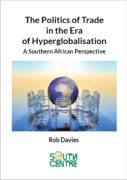Standards
The Politics of Trade in the Era of Hyperglobalisation: A Southern African Perspective
 About the Book:
About the Book:
Matters of international trade are increasingly widely recognised as major shapers of global politics. News bulletins are giving more and more coverage to matters like the so-called “trade wars” between the United States and China. These are, indeed, increasingly defining relations between the two largest economies in the world and could well underpin a multi-dimensional rivalry that could be a central feature of international relations for many years to come. Brexit is dominating and indeed re-shaping politics in the United Kingdom. By definition a rejection of a regional integration arrangement, Brexit has also revealed under-currents profoundly shaped by the outcome of a broader trade-driven process called “globalisation”. Just as regional integration is weakening in Europe, African countries have taken decisions that could lead to the most profound and ambitious step forward in African regional integration – the establishment of an African Continental Free Trade Area (AfCFTA). This study seeks to present an analysis of the political economy of trade negotiations over the past quarter century on two main fronts: the multi-lateral and those pertaining to regional integration on the African continent.
Author: Rob Davies is former South African Minister of Trade and Industry.
(more…)
Access to Hepatitis C Treatment: A Global Problem
“Viral hepatitis is an international public health challenge, comparable to other major communicable diseases, including HIV, tuberculosis and malaria. Despite the significant burden it places on communities across all global regions, hepatitis has been largely ignored as a health and development priority until recently”. – WHO, Global Health Sector strategy on viral Hepatitis 2016-2021: Towards ending viral hepatitis
(more…)
Mitigating the Regulatory Constraints Imposed by Intellectual Property Rules under Free Trade Agreements
IP provisions in FTAs may have implications on a wide range of public policy areas. A vast academic literature has addressed the “flexibilities” available under the TRIPS Agreement and the negative impact of FTAs in relation to access to medicines. (more…)
The WTO’s Special and Differential Treatment Negotiations (Paragraph 44)
Paragraph 44 of the 2001 Doha Ministerial Declaration mandates the ‘strengthening’ of Special and Differential Treatment (S&D) provisions in the WTO Agreement, and making them ‘more precise, effective and operational’. This Note tracks the evolution of these negotiations from the start of the Doha Round in 2001 until the Nairobi Ministerial in December 2015. (more…)
Pharmaceutical Innovation, Incremental Patenting and Compulsory Licensing.
Despite the decline in the discovery of new chemical entities for pharmaceutical use, there is a significant proliferation of patents on products and processes that cover minor, incremental innovations. A study conducted in five developing countries – Argentina, Brazil, Colombia, India and South Africa – evidenced a significant proliferation of ‘evergreening’ pharmaceutical patents that can block generic competition and thereby limit access to medicines. (more…)
IPR Misuse: The Core Issue in Standards and Patents.
Standards cover nearly all fields, including pharmaceuticals, food production, the environment, energy, information and telecommunications. Problems arise when IPRs are included in standards and a balance cannot be struck between the private interests of IPR owners and the integrity of standardization. (more…)
WCO SECURE: Lessons Learnt From the Abortion Of the TRIP-Plus-Plus IP Enforcement Initiative.
The objective of this research paper is to extract lessons from the negotiation process of SECURE, an initiative to promote TRIPS-plus-plus standards on IP enforcement at the WCO, and assist developing countries in addressing the emerging global challenges in IP enforcement initiatives. (more…)
How Developing Countries Can Manage Intellectual Property Rights to Maximize Access to Knowledge
This book addresses the debate on access to knowledge in three parts. Part I describes some of the challenges for access to knowledge. Part II of the book provides an account of recent developments in multilateral forums. Part III of the book seeks to advance the strategic considerations that should be useful to developing countries in addressing the challenges with regard to access to knowledge. It is hoped that the analysis, conclusions and recommendations presented in this book will contribute to a better understanding of the challenges to access to knowledge and of how to frame development-oriented policies to address them. The book is intended to reach a broad set of readers: it provides guidelines for developing countries’ governments in participating in multilateral and bilateral negotiations as well as to design national IP regimes consistent with those countries’ development objectives. It may also be of value to scholars, teachers, and students whose interests cover such areas as law, economics, political economy, diplomacy, international relations and other social science fields.
Download Book
Integrating Public Health Concerns into Patent Legislation in Developing Countries
The Agreement on Trade-Related Aspects of Intellectual Property Rights (TRIPs) requires all WTO Member countries to adapt their laws to the minimum standards set out in the Agreement, within established transitional periods. Conforming with the Agreement by recognizing or strengthening the protection of pharmaceutical products and processes by intellectual property rights (IPRs) has posed a special challenge for developing countries. The way in which the required legislative reform is made may have a significant impact on public health policies, and particularly on the population’s access to drugs.
This document presents options for the design and implementation of public-health-sensitive patent policies in developing countries. It examines approaches to selected issues in patent law that may help to strike a balance between the public and private interests involved in the protection of health-related inventions, including those of States, patients, and of the suppliers of health-related goods and services. This document has been prepared as part of an initiative aimed at exploring health-related aspects of intellectual property rights that may further the needs of the poor and excluded in developing countries. It is primarily addressed to policy makers and others concerned in the field of public health in developing countries.
Integrating Public Health Concerns into Patent Legislation in Developing Countries
 About the Book:
About the Book:











